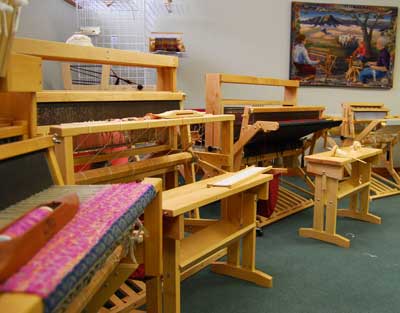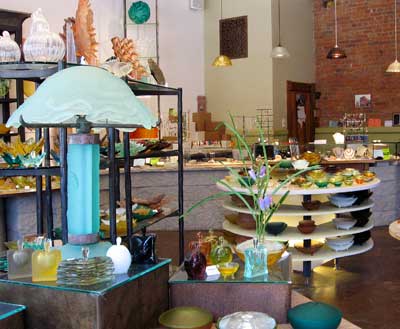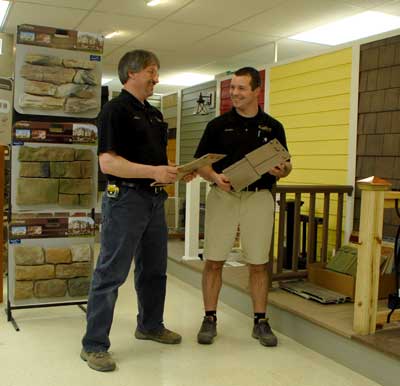American small businesses have survived changing economic tides with ingenuity, craftsmanship, and old-fashioned common sense. Here’s the story of how some are thriving despite challenging times.
Quigley’s Building Supply—Putting Customers First
The St. John River in Maine swiftly and relentlessly surged over its banks. After a record snowfall and heavy spring rains in May 2008, the river’s waters rose more than 30 feet. The lumberyard of Quigley’s Building Supply in Fort Kent, Maine, became a grim yardstick of the floodwater’s progress. Foot by foot, plank by plank, the water swallowed pallets of wood until the 66-year-old family business was 12 feet under water. In just an hour, more than $200,000 of the small business’s inventory was either waterlogged or swept away by the murky currents.
Six months before the flood, owner Norman Ouellette died in a boating accident at just 51 years old. That left general manager Justin Dubois, Ouellette’s son-in-law, running the company. Then, only a few months after the flood came, the man-made disaster of the financial crisis hit. Fresh from college and only 24 years old, Dubois felt a little like the Biblically unfortunate Job.
But Dubois wasn’t alone. Many other businesses throughout the country were submerged or swept away in the overflow of the financial meltdown. However, Quigley’s and many others survived and even thrived through these tough times.
Despite an economic mess and big businesses outsourcing labor and manufacturing, the spirit of small business continues to drive the growth of our nation with enterprise, ingenuity, and craftsmanship. Small businesses still create most of the nation’s new jobs, employ half of the country’s private sector work force, and produce more than half of the private sector gross domestic product, according to the Small Business Administration. Much like the hardworking Americans that came before them, the modern-day entrepreneurs you’ll meet here are striving for success against all odds, whether the problems are thrown at them by the economy or Mother Nature herself. These small businesses keep their doors open with a mix of smarts, guts, and determination, even in the face of unexpected hardship.
After the floodwaters crested, Quigley’s buckled down, adapted to the changes and challenges, and notched one of their highest sales years ever, with a 21 percent sales increase from 2008 to 2009.
“Just like everywhere else in the United States, there was a slumping economy and the housing market was nonexistent,” Dubois recalls. “If we just sat back and allowed it to happen, we’d fall. We looked at the slump as a chance to increase sales, customer traffic, and loyalty.”
To increase customer count, Quigley’s needed to find their niche. The store increased advertising, and management looked to long-term employees for new revenue suggestions. Of the 16 employees, many have been working for the company for 12 years or longer. Their know-how helped identify that customers were requesting more and more products they saw on television or the Internet. The bottom-line result for the store: The special order department has increased 50 percent in the past three years. “This has changed the way we do business,” Dubois says. “We’re increasing customer service. No matter where a customer sees a product, we can get it for them.
“The employees are the reason we changed,” he says. “I looked to them for advice and knowledge. We couldn’t have done that without their knowledge and support.”
Schacht Spindle Company—Woven to Success

Photo courtesy Schacht Spindle Company.
Pulling together the similar fibers of employee knowledge, Barry Schacht has spun the Schacht Spindle Company into the kind of American success story that’s vanishingly rare these days. The Boulder, Colorado-based company began in Schacht’s garage about 40 years ago and has grown into a 35,000-square-foot factory with 35 employees. Today, Schacht’s is the second-largest weaving supply and loom manufacturer in the world.
“In those early years, I made a point of finding people who knew more about the business than I did,” says Schacht, who owns the company with his wife, Jane Patrick. “That employee knowledge helped me create a better product.”
Schacht says he constantly strives to improve relations with his staff and provide them the right tools and benefits—both at work and in their personal lives. In addition to health insurance, the company offers two months of unpaid leave, assuring employees that they’ll still have a job when they return. Schacht and Patrick also built a special, environmentally controlled room for an employee with asthma and allow flexible schedules for workers with children.
“We hire people for their skills, then work with their schedules,” Patrick says. “We emphasize family values, getting back to what’s important. If employees need time to take care of a sick parent or child, it’s not a problem.”
The work atmosphere Patrick and Schacht created has paid off: The duo’s philosophy has fostered long-term staff retention. One employee has worked with the company for 39 years, a few others for more than 20, and several for more than 15. And Schacht is quick to credit those employees with the company’s ongoing success. For example, staffers recognized a market for lower-priced, entry-level, easy-to-use spinning wheels. Their input led to the development of the company’s new Ladybug spinning wheel. Adding to the company’s handmade cachet, each is unique, with a ladybug logo individually placed somewhere on the wheel. During the past two years, such entrepreneurship has helped Schacht Spindle Company to post a 35 percent sales increase. But the company can’t rest on such successes, and its bottom line can be dramatically affected by the fortunes of suppliers and profit-driven big box retailers. “Some of the companies I have dealt with over the years have disappeared,” Schacht explains. “I have had a more difficult time finding suppliers.”
Schadt’s hard work has paid off: The company’s spindles, looms, and winders are in just about any weaving supply store in the country, and they ship orders worldwide.
Yet, Schacht’s garage-born business roots are never far from his reach. On his desk is the first spindle he ever made. Constructed from an old, used doorknob and wooden stick, it’s the genesis of his business. “It reminds me of the complex, yet simple, beginnings,” he says. “When I started, what was most inspiring was making new products and solving old problems with a creative touch.”
Hudson Beach Glass—Hearts of Glass

Photo courtesy of Hudson Beach Glass.
The glass-blowing furnace in Hudson Beach Glass burns 24 hours a day. Visitors to the converted firehouse in Beacon, New York, feel the heat and hear the hum of the furnace that glows white hot, full of molten glass. For the 26-year-old company’s owners—John and Wendy Gilvey, Michael Benzer, and Jennifer Smith—that furnace is the source of their art and entrepreneurial freedom.
“In the last 26 years, we’ve been able to make the work we want to make,” John Gilvey says. “Doing that has been satisfying. I feel like I’ve done it my way. That’s so corny. But true.”
The different blown glass styles of the artist-owners are on the shelves throughout the store. John, for example, crafts Tiffany-like vases with leaf-like patterns. Benzer’s trademark work is hand-cast tiles and bowls that have been Hudson Beach Glass signature pieces for more than 20 years. Wendy Gilvey and Smith produce fluid-form pieces, often with opaque, sandblasted finishes.
“Every object we make, we’re proud of it,” Benzer says. “We’re not making big money, but we’re not sure we could work for anyone else.” John likens the Hudson Beach Glass business model to subsistence farming. “Or subsistence artists,” he says with a laugh. “We know we have done something right at the end of the year if we’re still in business.”
The four originally opened Hudson Beach Glass Studio in 1984 in a warehouse-type building and sold through distributors and trade shows. Seven years ago, they opened their retail store in an old firehouse on Main Street. In 2008, John’s son, Sean, opened his own Hudson Beach Glass storefront in Philadelphia. Works from the studio have been featured in the book 500 Glass Objects, and plates from the Philadelphia store were used by chef Jose Garces when he competed on the cooking reality show Iron Chef.
Such success came after riding more than two decades of up-and-down economic trends. The downturn of 2009 definitely caused some scrambling. “Our business took a big hit,” John says. “No one was calling with orders, no one was buying.” And they had to make the difficult decision to lay off four full-time employees. Knowing that their business could turn in a season, John and Benzer continually look for new markets and different ways to distribute their work. In recent years, they have expanded to include etched glass awards and table settings for high-end restaurants.
“We adjust to what’s happening in the marketplace,” John says. “We’re also continually experimenting with new colors, forms, and processes. In our business, new is everything.”
They learned that lesson in the mid-90s. After 20 percent to 30 percent growth per year, their business became flat. When attending a business consulting seminar, they realized the studio hadn’t been rolling out enough new products. “After that, we didn’t go to a trade show without something new,” Benzer says.
Become a Saturday Evening Post member and enjoy unlimited access. Subscribe now



